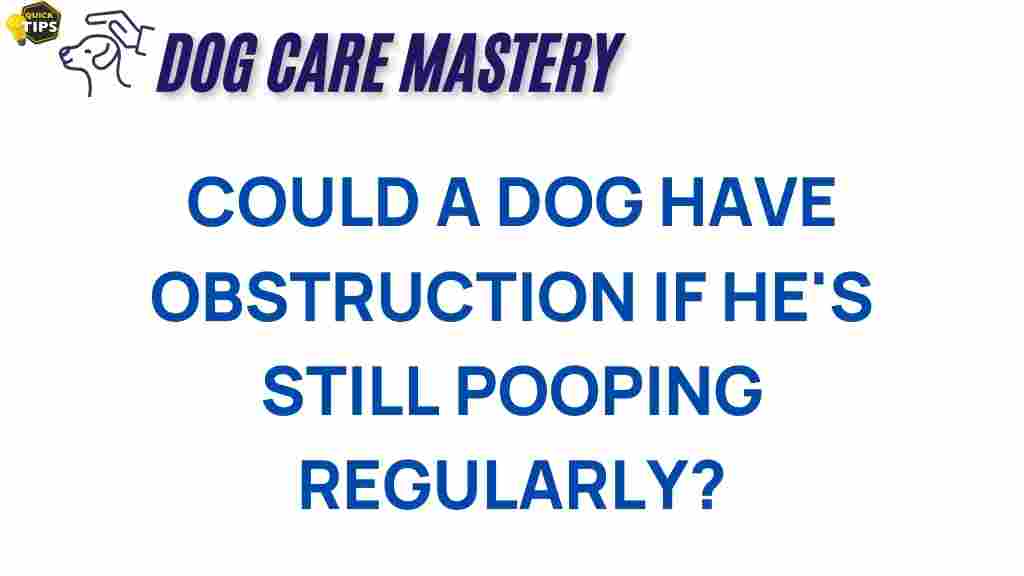Could a Dog Have an Obstruction While Still Pooping Regularly? Understanding Dog Health
As a devoted dog owner, ensuring your furry friend’s health is likely one of your top priorities. While most pet parents are vigilant about their dogs’ eating habits and behavior, it’s easy to overlook subtle signs that may indicate a problem. One common concern is whether a dog can have an obstruction while still pooping regularly. In this article, we’ll explore this important aspect of dog health, outline the signs of potential obstructions, and provide tips for keeping your dog healthy.
Understanding Obstructions in Dogs
Dog obstructions can occur in various forms, typically categorized into two types: partial and complete obstructions. A complete obstruction prevents any passage of stool, while a partial obstruction may allow for some stool to pass but can still lead to significant health issues.
What Causes Obstructions?
Obstructions can arise from various causes, including:
- Foreign Objects: Dogs are known for chewing and swallowing things they shouldn’t, such as toys, bones, or household items.
- Intestinal Parasites: These can cause blockages, particularly in younger dogs.
- Tumors or Growths: Abnormal growths in the digestive tract can block the flow of waste.
- Twisted Intestine: This condition, known as volvulus, can severely disrupt normal digestion.
Signs of an Obstruction
Even if your dog is pooping regularly, it’s crucial to watch for additional signs that may indicate an obstruction:
- Vomiting: Frequent vomiting can indicate digestive distress.
- Loss of Appetite: A dog that is not interested in food may have an underlying issue.
- Abdominal Pain: Signs of discomfort or pain when you touch their abdomen may signify a problem.
- Diarrhea: While some stool may pass, diarrhea can also be a sign of an obstruction.
- Lethargy: A lack of energy or enthusiasm may indicate that something is wrong.
Can a Dog Have an Obstruction While Still Pooping Regularly?
Yes, a dog can have an obstruction while still passing stool. This scenario often occurs in cases of partial obstruction, where some waste can still pass but is accompanied by other symptoms of distress. It’s essential to understand that regular pooping does not necessarily mean that your dog is healthy. The quality, consistency, and frequency of their stool must also be considered.
Understanding Stool Quality
When assessing your dog’s health, consider the following aspects of their stool:
- Consistency: Is the stool firm, loose, or watery?
- Color: Healthy stool is usually brown. Unusual colors may indicate a problem.
- Frequency: How often does your dog poop? A sudden change can be a sign of an issue.
Step-by-Step Process: What to Do If You Suspect an Obstruction
If you suspect your dog may have an obstruction, it’s crucial to act quickly. Follow these steps to assess the situation:
Step 1: Observe Your Dog
Take note of any unusual behavior or symptoms. Keep an eye on:
- Eating habits
- Physical activity levels
- Any signs of pain or discomfort
Step 2: Check the Stool
Examine your dog’s stool for consistency, color, and frequency. If you notice anything out of the ordinary, make a note of it.
Step 3: Consult Your Veterinarian
If you observe signs of distress or unusual stool characteristics, consult your veterinarian immediately. Be prepared to discuss your observations and any changes in your dog’s behavior.
Step 4: Diagnostic Testing
Your veterinarian may recommend tests such as:
- X-rays to identify foreign objects
- Ultrasound for a detailed view of the abdomen
- Blood tests to check for underlying health issues
Step 5: Follow Treatment Recommendations
Depending on the diagnosis, your vet may recommend various treatment options, including:
- Dietary Changes: Adjusting your dog’s diet may help alleviate mild obstructions.
- Surgery: In severe cases, surgical intervention may be necessary to remove the obstruction.
- Medications: Anti-nausea or pain relief medications may be prescribed to ease symptoms.
Troubleshooting Tips for Maintaining Dog Health
To prevent obstructions and maintain your dog’s overall health, consider implementing the following tips:
Regular Vet Check-ups
Routine veterinary visits are essential for early detection of problems. Make sure to schedule exams at least once a year, or more often for older dogs.
Monitor Your Dog’s Diet
Feed your dog a balanced diet appropriate for their age, size, and health condition. Avoid giving them human food that may cause digestive upset.
Provide Regular Exercise
Regular physical activity helps maintain digestive health. Ensure your dog gets sufficient exercise each day, tailored to their energy level.
Prevent Access to Hazardous Items
Keep small objects, toxic plants, and hazardous materials out of your dog’s reach. This can significantly reduce the risk of accidental ingestion.
Stay Informed
Being knowledgeable about common health issues can help you spot problems early. Resources like the American Kennel Club provide valuable information on dog health.
Conclusion
In conclusion, while it is possible for a dog to have an obstruction and still poop regularly, it is crucial to remain vigilant about their overall dog health. Regular monitoring of their behavior, diet, and stool characteristics will help you catch potential issues early. If you suspect your dog may have an obstruction, don’t hesitate to consult your veterinarian for a thorough evaluation and appropriate treatment. Remember, your furry friend relies on you for their health and well-being!
This article is in the category Health and created by dogcaremastery Team
